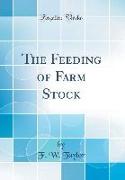The Feeding of Farm Stock (Classic Reprint)
BücherAngebote / Angebote:
Excerpt from The Feeding of Farm StockThe question to the dairyman and stock feeder of how 'to feed his stock the most economically is the all important one. These men are not usually in the business just for their health, but for the profits, and the profits depend largely on the difference between the cost of the materials put into the animal and the selling price of the products.During the past spring in writing a thesis for graduation on Dairy Rations Fed in New Hampshire, student Charles S. Batchelder sent out three hundred letters of inquiry to practical dairymen and feeders in the state. As a result of these inquiries it was found that out of the two hundred who replied only thirty kept a record of the grain and only six of the hay consumed by their cows. Forty kept a record of the total amount of milk produced but only three or four had any means of knowing just what each individual cow was doing for them. In these days of sharp competition and close margins only the man who thoroughly understands his business and conducts it in a careful businesslike manner can make a financial success. Stock feeding is becoming more and more a scientific busi ness and the man who succeeds must make an application of the scientific principles, the day of the careless, hap hazard unthinking feeder is past.About the PublisherForgotten Books publishes hundreds of thousands of rare and classic books. Find more at www.forgottenbooks.comThis book is a reproduction of an important historical work. Forgotten Books uses state-of-the-art technology to digitally reconstruct the work, preserving the original format whilst repairing imperfections present in the aged copy. In rare cases, an imperfection in the original, such as a blemish or missing page, may be replicated in our edition. We do, however, repair the vast majority of imperfections successfully, any imperfections that remain are intentionally left to preserve the state of such historical works.
Folgt in ca. 10 Arbeitstagen




